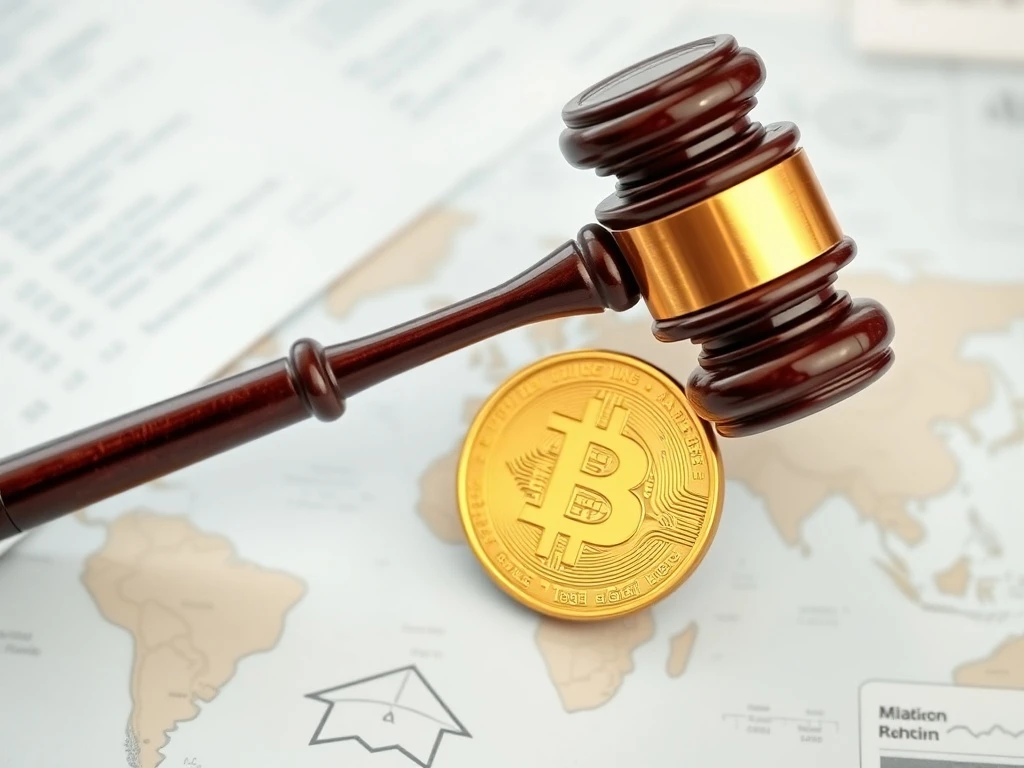FTX Bankruptcy: Why a Dangerous Ruling Could Reshape Global Crypto Payouts

The cryptocurrency world is holding its breath as the FTX bankruptcy case approaches a pivotal moment. A US bankruptcy court is set to decide on a motion that could drastically alter how creditors receive their crypto payouts, particularly those in countries labeled as ‘restricted jurisdictions.’ This isn’t just about FTX; it’s about a potential dangerous global precedent that could redefine trust and recovery in future digital asset insolvencies. Let’s delve into why this ruling is so crucial for every crypto holder and the broader ecosystem.
The Looming **FTX Bankruptcy** Decision
Next week, the US Bankruptcy Court in Delaware is poised to make a critical ruling concerning the FTX bankruptcy estate. The motion in question seeks to empower the estate to freeze payouts to creditors residing in a list of 49 countries deemed “restricted jurisdictions.” This move has ignited significant controversy, drawing a wave of objections from the global FTX creditor community.
- The Motion: Filed on July 2, it proposes withholding payouts from creditors in specific countries.
- The Scope: Affects creditors across 49 nations, with a significant concentration in China.
- The Deadline: A ruling is expected as early as Tuesday, making the outcome imminent.
Creditors, particularly those from affected regions, warn of severe repercussions if the court approves this motion. The fear is that such a decision could establish a new, concerning standard for handling international crypto bankruptcies.
Why These **Crypto Payouts** Spark Alarm
The implications of this ruling extend far beyond the immediate FTX case. For many creditors, the potential freeze on crypto payouts represents not just a financial loss but a fundamental threat to the integrity of the global crypto ecosystem. Weiwei Ji, a prominent Chinese creditor, voiced these concerns, stating, “This motion isn’t just about FTX creditors. It sets a dangerous precedent that could destroy trust in the global crypto ecosystem.”
The core of the alarm lies in the potential for similar actions in future crypto insolvencies. Imagine a scenario where any offshore exchange filing for bankruptcy in the US could unilaterally designate countries as ‘restricted,’ seize user assets, and legally refuse repayment. This prospect undermines the very decentralized and global nature that many attribute to cryptocurrencies, leading to what Ji describes as “devastating consequences.”
Decoding the **Restricted Countries** List
One of the most contentious aspects of the FTX estate’s motion is the methodology behind identifying ‘restricted countries.’ According to critics like Weiwei Ji, these lists are not determined by judicial review but rather by legal memos drafted by lawyers. This lack of judicial oversight in defining eligibility for payouts raises serious questions about fairness and due process.
The proposal has triggered a torrent of objections. Court records indicate at least 40 formal objections, though some creditors, particularly from the Chinese community, cite a higher number, potentially up to 69. The majority of these objections originate from Chinese FTX creditors, who represent a staggering 82% of the total value of potentially affected claims among these designated jurisdictions. Beyond China, objections have also come from countries like Saudi Arabia, with Faisal Saad Almutairi arguing that his country does not prohibit crypto ownership or trading, making regulatory fears an invalid basis for denying recovery.
Setting a **Global Precedent**: Beyond FTX
The central concern echoing through the creditor community is the establishment of a dangerous global precedent. If the FTX estate’s motion is approved, it could provide a blueprint for future crypto bankruptcies, particularly those involving offshore exchanges with a global user base. The worry is that this unilateral labeling of ‘restricted jurisdictions’ could become a standard procedure, effectively allowing entities to seize assets from users in certain regions under legal pretext.
This potential shift could profoundly impact how international crypto businesses operate and how users perceive the security of their assets on centralized platforms. It highlights the evolving challenges in crypto regulation and insolvency, where traditional legal frameworks grapple with the borderless nature of digital assets. The ruling will be closely watched by legal experts and crypto enthusiasts alike, as its outcome could influence the regulatory landscape for years to come.
Navigating **Creditor Objections** and Claim Volatility
The mere filing of the motion has already sent ripples through the market for FTX creditor claims. Federico Natali, a partner at Paxtibi, a bankruptcy claims-focused platform, reported a significant drop in the pricing of claims originating from these ‘restricted jurisdictions,’ ranging from 20% to 30%. This immediate market reaction underscores the tangible impact of the proposed policy.
For many creditors, the situation presents a difficult choice: fight for their rightful recovery or consider selling their claims at a discounted rate. Weiwei Ji expressed this dilemma, stating, “As for me, I’m still fighting to get what we rightfully deserve — not to be forced into selling our claims.” Sunil Kavuri, another FTX creditor, noted that substantial claims, including $380 million from China, remain pending resolution. Yuriy Brisov of CryptoMap emphasized that the decision to sell a claim depends on individual risk tolerance and understanding of the legal process, concluding that “when claims become currency, legal precision becomes strategy. And FTX is only one case in a new era of global digital insolvency.”
The FTX bankruptcy case is more than just a saga of financial collapse; it’s a crucible for shaping the future of global crypto regulation and asset recovery. The upcoming ruling on payouts to ‘restricted countries’ carries immense weight, threatening to establish a dangerous global precedent that could erode trust and create new vulnerabilities for crypto users worldwide. As the community awaits this critical decision, the implications for legal clarity, international cooperation, and the very spirit of a borderless digital economy hang in the balance. The outcome will undoubtedly influence how future crypto bankruptcies are handled, making this a landmark case in the ongoing evolution of the digital asset landscape.





